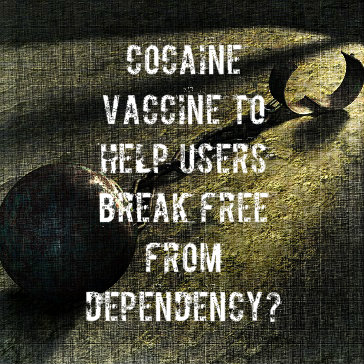The Search For A Cocaine Vaccine To Immunize Users From Dependency
 More than 22 million people in the United States are dealing with drug abuse, and the yearly healthcare dollars spent fighting this problem amount to more than 180 million. Cocaine abuse is one of the largest and most expensive problems under the larger umbrella of drug abuse, resulting in the most emergency room visits of any illicit drug.
More than 22 million people in the United States are dealing with drug abuse, and the yearly healthcare dollars spent fighting this problem amount to more than 180 million. Cocaine abuse is one of the largest and most expensive problems under the larger umbrella of drug abuse, resulting in the most emergency room visits of any illicit drug.
Unlike heroin addiction, which can often be treated successfully with a substitute drug called methadone, cocaine addiction has no such handy substitute available. But a small group of scientists have been working on another potential weapon for fighting cocaine abuse: a cocaine vaccine.
The idea for a drug abuse vaccine has been around for more than a quarter of a century. Currently, there are two major research teams actively engaged in developing a vaccine for clinical trials. These research groups are led by Kim Janda, Ph.D, of the Scripps Research Institute, and Thomas Kosten, M.D, of the Baylor College of Medicine. In 2010, Kosten’s team ran the first ever late-stage cocaine vaccine trial, with their vaccine TA-CD.
The Vaccine Principle
Vaccines have been in existence for hundreds of years, perhaps even more than 1,000 years. They operate in a very simple way: introducing a tiny amount of a disease (often in weakened or killed form) or something chemically similar to a disease into a person’s bloodstream so that the immune system is able to identify the invader and create antibodies. Once the human immune system learns to create antibodies for a particular disease, it can do so quickly again if the disease reappears.
However, a drug like cocaine is different from a disease-causing microbe. Cocaine in the bloodstream is much smaller than a microbe, and essentially invisible to the human immune system. As a result, recent approaches to the creation of a cocaine vaccine have involved attaching the vaccine to a virus. This helps the immune system learn to identify the substance and to destroy it.
Success Of Cocaine Vaccine And Questions
Both Kosten’s vaccine, TA-CD, and Janda’s vaccine, known as GNE, have had some measure of success in clinical trials. Janda and his research partner, Ronald Crystal of Weill Cornell, reported that GNE showed an impressive ability to destroy cocaine in the bloodstreams of monkeys. Kosten found similarly effective results from his human trial of TA-CD.
However, questions remain as to whether simply destroying cocaine in a person’s bloodstream is really an effective way of fighting drug abuse. Unlike measles or smallpox, two diseases almost completely eradicated in the first world because of vaccines, drug addiction is not simply a physical illness. Drug abuse can have serious physical effects, but addiction is a brain disease.
In the late-stage trial by the Baylor team, the results showed that the destruction of cocaine in addicts’ bloodstreams did not eliminate or reduce cravings for the drug. In some cases, the addicts in the trial took many times their usual dose of cocaine in an attempt to achieve the high that they were craving. For some subjects, this desperate search for a high was financially disastrous.
Addiction Prevention vs. Addiction Treatment
The purpose of a true vaccine is the prevention, rather than the treatment, of a serious disease. Although a cocaine vaccine may eventually be a successful tool for treating cocaine addiction, it may be even more effective when used as other vaccines are used: to prevent the initial development of a disease.
For individuals who are not addicted to cocaine, a successful drug vaccine could prevent them from ever experiencing any of the physical effects of the drug, including the chemical high that creates an addictive feedback loop in the human brain’s reward centers. This would prevent people from developing a dependency on the drug and suffering from cravings.
However, with so many people in the United States suffering from cocaine addiction, treatment remains a high priority for the scientists working on a vaccine. While an effective vaccine may never be a silver bullet that cures cocaine addiction on its own, it does have great potential as part of a larger treatment program. For example, a vaccine could essentially ensure addicts’ sobriety by destroying any cocaine that enters the system, even if they relapse.



